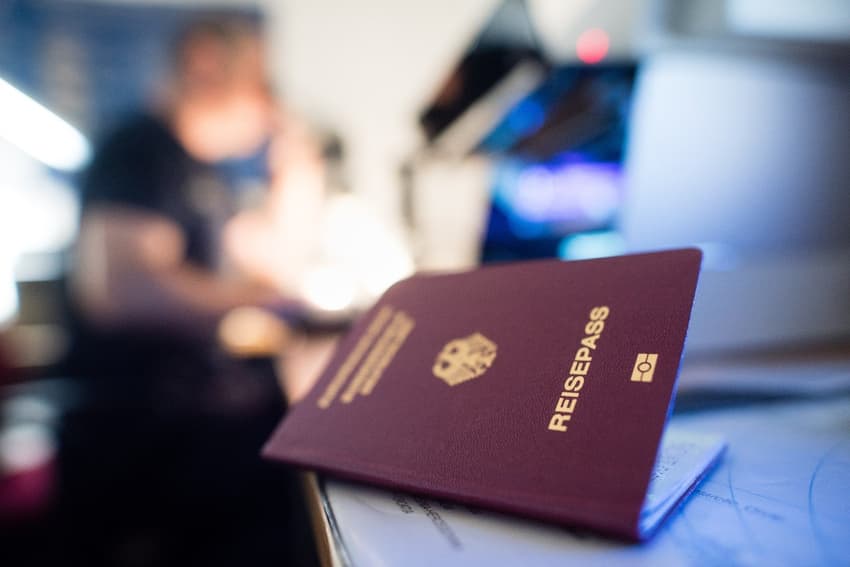How foreigners can get fast-track citizenship in Germany

People generally have to live in Germany for at least eight years before they can become naturalised Germans - but in some cases this can be cut to seven, six or even three. Here's what you need to know about fast-tracking your citizenship application.
Numerous countries in Europe, including popular expat destinations like France and Sweden, allow foreigners to apply for citizenship after just five years of residency.
At the moment, however, Germany is among the countries with the strictest citizenship rules, which require people to stay in the country for almost a decade before gaining the right to naturalise.
The new traffic-light coalition of the Social Democrats (SPD), Greens and Free Democrats (FDP) have agreed to liberalise some of the rules around citizenship, which will include drastically shortening the residency requirements for naturalisation.
Since it's unclear when these changes will come into force, however, here's a look at the current routes to speeding up your citizenship application. Then we'll take a look at what the new rules will be.
READ ALSO: What we know so far about Germany's plans to shake up fast-track citizenship
Applying after three years
Put simply, one of the easiest ways to get fast-track citizenship is to marry a German citizen. In this case, you can apply for citizenship after just three years of legal residence in the country.
There are still a few hoops to jump through, however: you and your spouse must have been married or in a registered partnerships for at least two years at the time of your application, and the other general conditions of citizenship, such as language skills and the ability to pass a citizenship test, also apply.
READ ALSO:
- TEST: Is your German good enough for citizenship or permanent residency?
- TEST: Could you pass the German citizenship exam?
Applying after five years
This one only applies to a small group of people but is nonetheless worth mentioning: stateless children who are born in Germany can get citizenship after just five years.
This might include the children of refugees or people in exile who have been stripped of their previous citizenship. As a rule, the application has to be submitted before the child's 21st birthday and they shouldn't have been involved in any criminal activities that could result in more than five years imprisonment.
Applying after six years
Two groups of people can apply for German citizenship after six years: refugees and the "specially integrated".
The first group includes asylum seekers, refugees and stateless adults who have lived in Germany legally for at least six years - including the period of time spent waiting for a decision on their asylum application. The other benefit that this group of people have is that Germany generally permits dual nationality for refugees. Though the Interior Ministry is currently working on changing this rule for everyone, currently dual nationality is only allowed in Germany in exceptional circumstances or for EU citizens.
For the second group, the criteria can be slightly confusing: what exactly counts as proof of being exceptionally integrated?

Students look through learning materials in a German class. Photo: picture alliance/dpa | Sven Hoppe
Well, the most simple answer is language skills. While most applicants for citizenship are expected to have at least B1 German, if you can pass a B2 language test you will generally be eligible to apply for fast-tracked citizenship after six years.
If your language skills aren't quite up to scratch, all is not lost. There are other options for proving exceptional integration, which can include holding a masters degree or doctorate from a German university, having completed vocational training in the country or showcasing high professional and/or academic achievements.
Officials can also take into account "a special commitment to Germany" in an application for citizenship after six years. While this might sound a bit vague, it generally means a prolonged period of voluntary work in a charity or other non-profit organisation.
Different federal states can also have their own specific criteria, so if you think you might be eligible for citizenship and have been here for six years (or nearly six), the best thing to do is to seek out the advice of your local Einbürgerungsbehörde (Citizenship Office).
Applying after seven years
People who want to shave a year off the required residency for citizenship can reduce it from eight to seven by completing an integration course.
These special courses for foreigners are designed not only to take your language skills up to the B1 level required for citizenship, but also to give you a full grounding in German everyday life, laws and culture.
In some cases, you may be eligible to take an integration course for free or have it funded by an employer. To find out more, check out our list of groups who can learn German for free in Germany:
EXPLAINED: Who is entitled to free language lessons in Germany?
Otherwise, they generally cost around €2.20 per teaching hour, which equates to €1,540 for a full integration course with 700 teaching hours.
What about derivative naturalisation?
Derivative naturalisation is another possibility for speeding up your citizenship application. This very legalistic-sounding word basically means that your right to citizenship is derived (gained) through someone else.

Newly naturalised citizens hold a declaration of allegiance to Germany. Photo: picture alliance / Matthias Balk/dpa | Matthias Balk
In plain English, this means that spouses who may not have clocked up enough years in Germany to apply for citizenship can submit an application at the same time as their spouse. The same applies to minors, who can apply at the same time as their parents.
This can be one of the simplest ways to gain German citizenship faster, but it does require at least one person in the family to be fully eligible to apply.
READ ALSO: EXPLAINED: How I got German citizenship – and how you can too
What about the changes to the Nationality Act?
This should simplify life for foreigners who want to become German even more.
In their coalition pact, the parties of the traffic-light coalition pledged to cut the general residency requirements for citizenship down from eight years to five, and slash the residency requirements for exceptionally integrated people from six years to three.
However, people will have a slightly tougher route for naturalising under the three-year route. According to the draft law obtained by The Local, C1 German language skills would required alongside proof of special integration in order to qualify. Don't be too disheartened if this sounds unrealistic, though, as it looks like B1 will still be the standard for those who naturalise after five years.
The change will come alongside other sweeping changes to citizenship law, including allowing third-country nationals to keep their previous nationality while becoming German.
Though there isn't a clear date for this legislation to be signed into law, it's believed to be a priority project for Interior Minister Nancy Faeser (SPD), and government sources have told us they have their sights set on summer.
READ ALSO: German citizenship: Can people who apply before the law changes get dual nationality?
Comments
See Also
Numerous countries in Europe, including popular expat destinations like France and Sweden, allow foreigners to apply for citizenship after just five years of residency.
At the moment, however, Germany is among the countries with the strictest citizenship rules, which require people to stay in the country for almost a decade before gaining the right to naturalise.
The new traffic-light coalition of the Social Democrats (SPD), Greens and Free Democrats (FDP) have agreed to liberalise some of the rules around citizenship, which will include drastically shortening the residency requirements for naturalisation.
Since it's unclear when these changes will come into force, however, here's a look at the current routes to speeding up your citizenship application. Then we'll take a look at what the new rules will be.
READ ALSO: What we know so far about Germany's plans to shake up fast-track citizenship
Applying after three years
Put simply, one of the easiest ways to get fast-track citizenship is to marry a German citizen. In this case, you can apply for citizenship after just three years of legal residence in the country.
There are still a few hoops to jump through, however: you and your spouse must have been married or in a registered partnerships for at least two years at the time of your application, and the other general conditions of citizenship, such as language skills and the ability to pass a citizenship test, also apply.
READ ALSO:
- TEST: Is your German good enough for citizenship or permanent residency?
- TEST: Could you pass the German citizenship exam?
Applying after five years
This one only applies to a small group of people but is nonetheless worth mentioning: stateless children who are born in Germany can get citizenship after just five years.
This might include the children of refugees or people in exile who have been stripped of their previous citizenship. As a rule, the application has to be submitted before the child's 21st birthday and they shouldn't have been involved in any criminal activities that could result in more than five years imprisonment.
Applying after six years
Two groups of people can apply for German citizenship after six years: refugees and the "specially integrated".
The first group includes asylum seekers, refugees and stateless adults who have lived in Germany legally for at least six years - including the period of time spent waiting for a decision on their asylum application. The other benefit that this group of people have is that Germany generally permits dual nationality for refugees. Though the Interior Ministry is currently working on changing this rule for everyone, currently dual nationality is only allowed in Germany in exceptional circumstances or for EU citizens.
For the second group, the criteria can be slightly confusing: what exactly counts as proof of being exceptionally integrated?

Well, the most simple answer is language skills. While most applicants for citizenship are expected to have at least B1 German, if you can pass a B2 language test you will generally be eligible to apply for fast-tracked citizenship after six years.
If your language skills aren't quite up to scratch, all is not lost. There are other options for proving exceptional integration, which can include holding a masters degree or doctorate from a German university, having completed vocational training in the country or showcasing high professional and/or academic achievements.
Officials can also take into account "a special commitment to Germany" in an application for citizenship after six years. While this might sound a bit vague, it generally means a prolonged period of voluntary work in a charity or other non-profit organisation.
Different federal states can also have their own specific criteria, so if you think you might be eligible for citizenship and have been here for six years (or nearly six), the best thing to do is to seek out the advice of your local Einbürgerungsbehörde (Citizenship Office).
Applying after seven years
People who want to shave a year off the required residency for citizenship can reduce it from eight to seven by completing an integration course.
These special courses for foreigners are designed not only to take your language skills up to the B1 level required for citizenship, but also to give you a full grounding in German everyday life, laws and culture.
In some cases, you may be eligible to take an integration course for free or have it funded by an employer. To find out more, check out our list of groups who can learn German for free in Germany:
EXPLAINED: Who is entitled to free language lessons in Germany?
Otherwise, they generally cost around €2.20 per teaching hour, which equates to €1,540 for a full integration course with 700 teaching hours.
What about derivative naturalisation?
Derivative naturalisation is another possibility for speeding up your citizenship application. This very legalistic-sounding word basically means that your right to citizenship is derived (gained) through someone else.

In plain English, this means that spouses who may not have clocked up enough years in Germany to apply for citizenship can submit an application at the same time as their spouse. The same applies to minors, who can apply at the same time as their parents.
This can be one of the simplest ways to gain German citizenship faster, but it does require at least one person in the family to be fully eligible to apply.
READ ALSO: EXPLAINED: How I got German citizenship – and how you can too
What about the changes to the Nationality Act?
This should simplify life for foreigners who want to become German even more.
In their coalition pact, the parties of the traffic-light coalition pledged to cut the general residency requirements for citizenship down from eight years to five, and slash the residency requirements for exceptionally integrated people from six years to three.
However, people will have a slightly tougher route for naturalising under the three-year route. According to the draft law obtained by The Local, C1 German language skills would required alongside proof of special integration in order to qualify. Don't be too disheartened if this sounds unrealistic, though, as it looks like B1 will still be the standard for those who naturalise after five years.
The change will come alongside other sweeping changes to citizenship law, including allowing third-country nationals to keep their previous nationality while becoming German.
Though there isn't a clear date for this legislation to be signed into law, it's believed to be a priority project for Interior Minister Nancy Faeser (SPD), and government sources have told us they have their sights set on summer.
READ ALSO: German citizenship: Can people who apply before the law changes get dual nationality?
Join the conversation in our comments section below. Share your own views and experience and if you have a question or suggestion for our journalists then email us at [email protected].
Please keep comments civil, constructive and on topic – and make sure to read our terms of use before getting involved.
Please log in here to leave a comment.